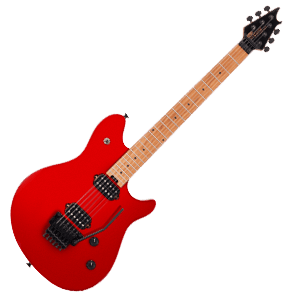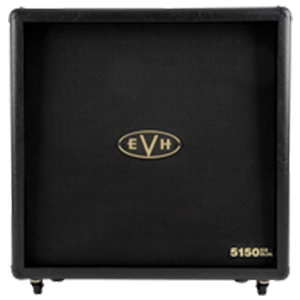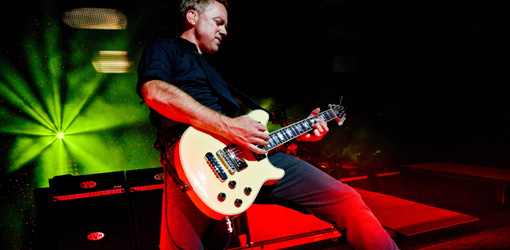Guitarist Kurt Allison rose to Nashville fame when he teamed up with drummer Rich Redmond and bassist Tully Kennedy to form the Three Kings, one of Music City’s most-respected and sought-after rhythm sections.
And for the past few years, fans have seen the trio on stage and television as they lay down the background for country best-seller Jason Aldean.
Recently, Allison, Redmon and Kenedy formed a production company called New Voice Entertainment, which is generating even more buzz around Nashville.
EVHGear.com got a chance to talk with Allison about his career and some of the gear he uses.
EVHGear.com: How did the Three Kings come about?
Allison: Rich, Tully and I have been playing together for a long time. I met Rich around ’97 at a gig. Literally, I haven’t played a gig without him since then. Tully, I met about a year after, and we all clicked once we started playing together. It’s worked because of a couple of reasons. One, we genuinely like each other. And two, we love the way each other plays. It’s one of those things where we’d want to bring each other in if any of us were offered a gig to play with someone else. I don’t want to do it without my guys.
You hear of people saying, “Well, I’ve already got a drummer” or “I’ve got my own bassist.” A couple grand in those days is great money, but we never did that.
We thought we had a little coup going, and it turned out great for us because people started hiring us as a rhythm section.
What’s behind the nickname?
The funny thing about the name “Three Kings” is that it was originally a joke. It’s a little over-the-top. We called each other that just to make fun of it, but somehow, somebody called us up and said, “Hey, we’re looking to hire the Three Kings,” and we laughed our asses off. Somehow it got around town, but it turned out fine. We’ve played with Jason since ’99, so it’s been about 14 years on this ride.
 You’ve played on so many hits that went to the top of the charts. Is there a favorite one to play live?
You’ve played on so many hits that went to the top of the charts. Is there a favorite one to play live?
That’s always a tough one. As with most players, I bet, the songs that tend to be the favorites are the ones that didn’t get released or are b-sides. I don’t know if that’s because you play the other hits so much. Playing those are always fun in the moment, but I listen to the b-sides mostly. You forget about them sometimes.
You were primarily a live artist, and now you pull double duty by getting in the studio, and have for years. Do you think there is a disparity of musicians that can do both at a high level?
The reason why, I don’t know. But when I came to Nashville, you were labeled either a studio guy or a session guy. Not both. There was almost a war between live guys and session guys. There’s always that thing. Michael Knox, I give him credit. He produced Jason’s record, and he said, “I want that live energy in the studio.” Honestly, I wasn’t ready to get into the studio at that time. It’s a different animal. I do see what those studio guys are saying. When you have to come up with parts and play them with feel and energy, it’s a different ballgame. But I don’t think the live guys get enough credit for doing what they do. I do believe that here in Nashville, some artists are starting to use their live guys on record, and it’s sounding pretty cool and unique. I always wondered why you wouldn’t want to use your live guys on record. I’d like to think that it’s moving in that direction.
Why did you decide to start New Voice Entertainment?
It was the next step for us, really. We were playing with a great live act and doing some good things in the studio, but what was really going to set ourselves apart? One of our first projects was this artist named David Fanning and we liked him so much and he was really talented. He’s a great songwriter and producer in his own right and we’ve been doing it a while with him. We formed a friendship at first, but it turned into taking what was previously a group of three to a four-man company. He’s a great songwriter, and we’ve been doing it for a while with him.
What is a newer artist you’re working with that you’re excited about?
One of new ones we’ve got coming out soon is a girl called Lindsay Ell. She’s a guitar player, and a good one at that. The norm in Nashville is if you’re young and blond and can somewhat sing, you can get a record deal. Well, she is cute and can sing, but she plays the electric guitar, and she plays it really well. That’s not the norm. We just did six things with her and think we’re going to put it out in July. That’s exciting because it’s fresh and different. I think we’re all pretty stoked about that one.
How did you come about using the EVH 5150?
I was introduced by Matt Bruck, who has been with EVH for a long time, by an acquaintance, and he told me that I should check out the amp. To be honest, I was a little skeptical at first. I mean, we play a little rock and country, but nothing too rock-y. He was telling me about the first channel, and I said I’d do him a favor by trying it out. I got the amp and fell in love with the first channel. It sounds great. It’s tight, it’s crunchy, it doesn’t overdrive too much, but it does enough. I love the uniqueness of the 100-watt and the 50-watt. I loved the way I could get the second channel to work for me. The third is obviously a little too much for the genre[laughs], but I called him back and told him I loved it.
And I met Jeff Cary and Mike Tempesta, and it was a big deal for me to feel good about the people I work with. Those guys have been great to me. Whenever I need anything, a backline, anything from Vegas to L.A. to Nashville, they’ve got it. Any repairs, they’ve got it. All the way around, it felt like a good fit. I couldn’t be happier.











